Whiskies from Grain to Glass | Bruschetta 3 ways | Cooking with Bananas!



32






Whiskies from Grain to Glass | Bruschetta 3 ways | Cooking with Bananas!



32





It’s been a focused week of writing and editing for me, and whether I’m writing about restaurants or drinks, I can’t help but notice certain words leap out as they’re repeated over and over.
I seem to be writing the word ‘collaboration’ increasingly, and when thinking about this, I realise that it’s one of the things that attracted me and that I love most about our province. Brewers and distillers are working together to create new drinks, restaurants are sharing spaces, and they’re hosting dinners cooking alongside chefs from different restaurants and bars, all working together to create memorable experiences for their guests.
I know it’s not that way in many other cities I’ve visited and worked. Like
together and share our knowledge, our experience, our physical space, and our staff, and it seems we’re doing it more and more!
Wishing everyone who is a dad and everyone who has a dad, a very happy Father’s Day.
Cheers Linda, Editor-in-ChiefCorrection:
Our apologies, in our article, "Wineries of Alberta" in last month’s issue, Shady Orchards and Winery was attributed as being located in High River when it should have been High Prairie.


Thanks to everyone who took part in our 9th annual Treasure Hunt at Calgary Farmers’ Market West; the feedback has been phenomenal. We received emails from the destinations saying, “It was by any measure a tremendous success, all the participants were having a wonderful time, and the costumes were amazing! People were so stoked about it, as well as the participating vendors,” and “All the participants appeared to be having a great time. For many, it was their first time at the market and they were grateful that they had signed up for the event.”
And from the participants, “We just wanted to say Thank You for a lovely day. We thought the whole treasure hunt was very well organized and so thoughtfully done. The vendors were all very friendly and willing to spend time with us. We had an amazing day, with a lot of samples and take-
Elevate your grilling game with all natural Alberta-raised Piedmontese beef.
Grocery. Bakery. Deli. Café.



Editor-in-Chief/Publisher
Linda Garson linda@culinairemagazine.ca
Managing Editor
Tom Firth tom@culinairemagazine.ca
Multimedia Editor
Keane Straub keane@culinairemagazine.ca
Sales
Tara Zenon 403-472-1345 tara@culinairemagazine.ca

Design

Kendra Design Inc
Contributors
Elizabeth Chorney-Booth
Natalie Findlay, Dong Kim
Renée Kohlman, Katarzyna Kowalewska
Adrianne Lovric, David Nuttall
Keane Straub
To read about our talented team of contributors, please visit us online at culinairemagazine.ca
Katarzyna is originally from Poland, and she has found her home here in Alberta. It wasn't until she married a chef that she found her passion for food and beverage photography, and now works as a freelance photographer, creating drool-worthy images of food and vibrant drinks. Her second, and equally important love in photography is portraiture. Katarzyna is passionate about baking; she is also a big time bookworm and crazy about puzzles.
David Nuttall
David has worked in liquor since the late 1980s. He achieved his Beer Judge Certification in 2012, and is the head judge for Calgary International Beerfest, as well as judging the Alberta Beverage Awards and Alberta Beer Awards. He has appeared on radio, television, and in the movie Aleberta: Our Beer History. He is also a freelance writer for print and online, speaker, and has run Brew Ed beer courses since 2014. Follow him @abfbrewed.

Dong Kim
Contact us at: Culinaire Magazine
#1203, 804–3rd Avenue SW Calgary, AB T2P 0G9 403.870.9802
info@culinairemagazine.ca
@culinairemag
@culinairemag
facebook.com/CulinaireMagazine
For subscriptions, competitions and to read Culinaire online: culinairemagazine.ca

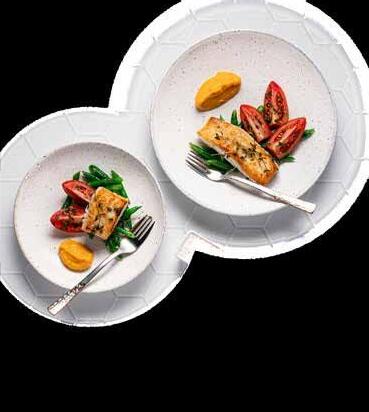
A freelance photographer and consultant, Dong splits his time between Edmonton and Calgary. Although he shoots a wide range of subjects, his passion lies in photographing food and capturing stories from the food community. An avid traveller whose itineraries often revolve around learning about cultures through its culinary scene, Dong shares many of his travels and food encounters on Instagram at @therealbuntcake.
Culinaire Magazine acknowledges that we live, work and play on the traditional territories of the Blackfoot Confederacy (Siksika, Kainai, Piikani), the Tsuut'ina, the Îyâxe Nakoda Nations, the Métis Nation (Region 3), and all people who make their home in the Treaty 7 region of Southern Alberta.

Calgary’s Bono Coffee Roasters are growing, with a new location in Bridgeland, at 773 1 Avenue NE. Partners Dawit Wubie and Danait Tesfay are experts in hand-roasting coffee beans having grown up in Ethiopia, and you can enjoy their speciality, small-batch, premium, Ethiopian coffee along with scones, croissants, and pastries, at their original Manhattan Road location as well as the new café. Bags of their roasted beans are available to purchase in the café, as well as to order online, and there’s a monthly coffee subscription for bags delivered to your door. Seven days, bonocoffee.ca
Women-led and community-driven, Edmonton’s Kind Ice Cream has now opened a third location in Oliver’s brand new OEX II Building at 12017 102 Avenue, in addition to their Ritchie and Highlands stores. Made in small batches, Kind use Alberta milk, cream and eggs, and offer a wide choice of flavours as well as dairy-free ice cream, made with coconut cream and cocoa butter. 11-10 pm daily. kindicecream.ca

After 11 years, Calgary’s Village Brewery has a new taproom! Sarah Ward Interiors has created a beautiful, bright, and colourful space on the ground floor of the brewery at 5000 12a Street SE, with a garage door opening onto the dog-friendly patio, 16 beer taps, and a tasty menu of dips, sandwiches, salads, and smoked meat dishes from Chef Don Saviak of ABC Outpost Kitchen –and of course plenty of delicious craft beer! Closed Sundays and Mondays, villagebrewery.com
Self-described as Alberta’s first plant-based pizzeria, Edmonton chef, Neil Royale’s Die Pie has a new location at 11817 105 Avenue. 12 pizzas come in a choice of three styles: Neapolitan thin crust, Detroit THICC, or gluten-free, with
vegan burgers, pizza bites, nachos, and more, also on offer to eat in, pick up, or have delivered. Lunch and dinner, closed Mondays. diepie.ca
Egg & Spoon, Calgary’s latest breakfast, brunch, and lunch spot, is the inspiration of award-winning chef, Liana Robberecht, along with founder, Patrick Chiu. They gave Executive Chef, Jason Moore, (at the Petroleum Club for the last 20 years!) free rein to create his playful, all-day breakfast and lunch menu, and having celiac disease, he’s focused on locally sourced, clean ingredients, and diversity. Don’t miss the signature deviled eggs, turkey maple sausage rolls, gluten-free bread (you’d never guess!) from Invermere Bakery, many excellent smoked meat dishes, and the outstanding potato hash cooked in bacon grease with maple syrup and lemon seasoning. Come hungry, the portions are generous! 7729 Macleod Trail. 7-3 pm, seven days. eggandspoon.ca
Edmonton’s May Restaurant has reopened in the ex-Canteen space at 10522 124 Street. Celebrating Albertagrown food, culture and heritage, with plates meant to be shared, brunch runs until 3 pm, when a menu of elevated Bites, Garden & Grain, and Field & Fish dishes kicks in. Closed Mondays, restaurantmay.ca
The Stables on the Currie Barracks is now home to Burwood Distillery, Vaycay Brew Co, and their collab taproom – Veranda. This K-shaped building has been completely restored with a brewery at one end, a distillery at the other, a terrific taproom with a great menu, and a 120-seat, dog friendly, south facing patio in the middle. Chef Sammy Mehler-Allaby (ex-Model Milk) is cooking up some superb share plates, handmade pastas, salads, wings, as well as a kiddies menu,
with honey from Burwood’s apiary and beef from YV Ranch where the cattle are fed the spent grain! 200, 2566 Flanders Avenue SW, Calgary. Lunch, dinner, and snacks every day. verandayyc.com
Darling now has a permanent Edmonton location! They’re at 9616 82 Avenue, serving up Head Chef Lindsay James’ menu focused around local, seasonal ingredients, with globally inspired sharing plates for brunch, dinner, and snacks every day, along with their notable rotating natural wine list. darlingrestaurant.ca
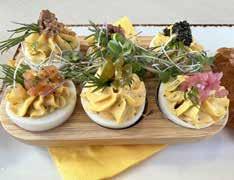

Chef’s Earth now has a bricks and mortar location in Calgary’s Mark on 10th building, at 1019 8 Street SW. Now you can build your own nutritionally dense salads, hot bowls, and wraps, downtown as well as at Calgary Farmers Market South - or order from the menu. This is feel good food, with a choice of 52 natural ingredients to personalise your meal, a big breakfast selection, a daily soup, mac ‘n’ cheese, and Marley coffee. Eat in at this clean and bright, small café, and smell the fresh herbs on the wall, snag a seat in the nook or on the little patio - or pick up and take your choice back to your desk or home! Seven days, chefsearth.ca
Do you have a notable achievement we should know about? A new opening, launch, rebrand, or accolade?

This is exactly the sort of book that can come across as trite or even pandering as it tries to connect with Dads who may or may not want to be in the kitchen. Instead – and quite welcoming, it isn’t page after page of barbecue recipes or homemade playdough, but concise, wellwritten recipes with introductions that should appeal to Dads of all stripes and types out there. Take the introduction for Sweet Peas & Avocado Guacamole (p.45) “When I have guacamole, I don’t want just a little bit – I want to go hard on the stuff” – how’s that for a hook? But packed within are dynamite lunch recipes, weeknight dishes, weekend projects (when we have lots of time right?), but also holiday specials, and criminally overlooked in most books – date night recipes.
Written by two dads, who might have some experience feeding hungry kids, but

also some well-established food-centric careers - Vitiello as a chef consultant and Johns as a food critic and writerthe dishes are well shot, and seem very possible to the home gourmand, but also with an air of cultivated chaos that can sometimes happen when little ones are clamouring for sustenance and attention. Some of the most enticing dishes inside aren’t those that scream out traditional, Canadian-style cuisine, but those that borrow from range of cultures, so there is a fair bit of variety to work with. Top of my list for making or sharing with the family would be the Cucumber Salad (p.69), but also a time saving, One-Pot Braised Turkey Meatballs (p.76), and robust looking Warm Potato Salad (p.151). From the Date Night category, I think the Baked Gnocchi (p.178) will be a hit, and for the sweet toothed, the Double Chocolate Peanut
Butter and Sea Salt Cookies seem destined to be a family favourite (p.187)
My favourite part of this is that it’s a book that tries to speak to the dads – without judgement or bias; this isn’t a grillmaster’s book but a balanced, interesting, and tasty approach. In many ways this is a book about sharing the load on the home front, but in many others, it’s really just about providing a great meal, suitable for everyone in the household.

Summer is back, and rumour has it this one will be another scorcher for Alberta. That means that anything that can be done outdoors will be done outdoors, and this includes entertaining and, of course, eating!
We asked three Alberta brewery chefs to give us their best recipes for just that: eating al fresco, and they did not disappoint. With a bit of planning and preparation these dishes come together effortlessly, leaving you plenty of time to enjoy the weather and your company, with a cool drink of choice in hand.
Pulled Pork Tacos
Serves 4-5
3 garlic cloves, minced
2 Tbs (30 mL) lime juice (about 1 lime)
1 Tbs (15 mL) vegetable oil
1 tsp kosher salt
¼ tsp black pepper
1 tsp dried oregano
½ tsp onion powder
½ tsp cumin
processor. Pulse until well combined, and a paste is formed.
For Executive Chef Hans Pinto of Edmonton’s Campio Brewing, food is all about exploring. “Travel has a huge influence on my cooking and what inspires me. I love to explore traditional ethnic cuisines from around the world and look to find a way to develop our menu at Campio or when I’m cooking at home.”

Campio’s menu boasts everything from the Quinoa Falafel Bowl (one of Chef’s Hans’ faves) to a range of Chicagostyle deep dish pizzas. The Pulled Pork Tacos, another of Chef’s favourites, are a great choice for eating al fresco: “This is a perfect dish for sharing, fun and interactive to serve and does not take too much effort to put together for a larger group.”
Preparation is key. “Plan ahead and organize yourself at least one day in advance - you will thank yourself later,” adds Chef Hans. The pork, veggies, and salsa can all be prepared a day in advance, and don’t stress about finding all the right spices – there are substitutes for everything. “All the changes can be made on personal preference, that is the magic with Tacos. Everyone has their own favourite combinations.”
1-2 individual chipotle peppers, from a can of chipotle peppers in adobo sauce
1 Tbs (15 mL) adobo sauce, from a can of chipotles in adobo
650-900 g skinless boneless pork shoulder, excess fat trimmed
2 Tbs (30 mL) orange juice (about ½ orange)
½ cup (120 mL) chicken broth
1 bay leaf
Corn tortillas
Your Choice of Toppings:
¼ head cabbage, shredded Pickled jalapeños, sliced
2 ripe avocados, scooped and sliced into wedges
½ cup yellow onion, diced ½ cup ripe pineapple, diced Pickled onions, sliced Chipotle aioli or mayonnaise
Fire roasted tomato salsa or salsa verde –from your local Latin grocery store
Latino hot sauce of your choice (chef chooses Valentina’s)
Fresh cilantro, chopped
1. Place garlic, lime juice, oil, salt, black pepper, oregano, onion powder, cumin, peppers, and adobo sauce in a small food
2. Rub the pork shoulder with the chipotle paste, rubbing it thoroughly on all sides. If time allows, let the pork marinate for 30 minutes up to overnight. If not, go to the next step.
3. Place orange juice, chicken broth, bay leaves, and seasoned pork shoulder into a slow cooker. Cook for 8 hours on low or 4 hours on high, until internal temperature reaches 145° F on a food thermometer. The pork should be so tender that meat falls apart easily.
4. Remove pork from the slow cooker and shred the meat using two forks, removing excess fat. Taste and adjust seasoning if needed.
5. Heat oven to broil. Line one baking sheet with foil and spray with cooking oil.
6. Place carnitas onto a baking sheet with a cup or so of the juices and broil until the pork looks golden, crisp, and crusted about 4 minutes. Remove from oven.
7. While pork is browning, place a large sauté pan or skillet on medium high heat. Begin to warm tortillas double stacked until they begin to puff and slightly brown and blister. Flip after 30-45 seconds and allow to brown on the other side. Place warmed tortillas on a plate covered with a clean folded kitchen towel and hold until pork is ready.
8. Arrange your table with your choice of toppings, warm tortillas and hot pork. Begin to build your tacos and enjoy!

Inspiration comes from several different sources for Executive Chef Walter Malowany at Calgary’s Bitter Sisters. “My influences are other restaurants that I admire, that are food focused and creative, (using) local and seasonal ingredients, as well as magazines and books.”

Dishes like the Meta Mezze platter and the Nashville Chicken Sandwich are Chef Walter’s top choices from the menu, but when it comes to entertaining at home, he enjoys a classic like this Ribeye Steak with Warm Mushroom Salad.

“Steak was always a popular meal at my mother’s farm. My mother was rather health conscious, not big on brand name products and I became somewhat obsessed with recreating store-bought condiments at work and at home.”
“Prep as much as possible so you can enjoy the evening chatting with those you’re cooking for. Local Alberta beef is always preferred, and make sure you let your steaks rest for at least 8 minutes before slicing,” says Chef Walter. “Seasoning is extremely important. Add just the right amount of salt and get a good sear on the mushrooms.”
Mushroom Salad and A1 Red Ale Sauce
Serves 2-4
7-10 baby potatoes, halved
2 Tbs (30mL) olive oil

3 slices bacon, diced
2 cups of mushrooms (shitake, cremini, oyster or a mix), rough chop
2 Tbs butter
2 handfuls arugula
1 bunch of spinach
2 Tbs (30 mL) of your favourite light-coloured beer
¼ cup butter
¼ cup (60 mL) canola oil
1 Tbs (15 mL) balsamic vinegar,
1 Tbs (15 mL) apple cider vinegar
½ tsp (2.5 mL) Dijon mustard
410 g ribeye steak
1. Toss potatoes in 2 Tbs (30 mL) olive oil, and salt and pepper, and cook in oven at 375º F for 20 minutes.
2. Fry bacon until crisp.
3. Add butter to a hot cast iron pan, add left over bacon fat and place mushrooms in pan well spaced out, sear for 3-4 minutes, season with salt and pepper.
4. Toss in 2 handfuls of arugula and a



bunch of spinach, deglaze with beer (chef likes Uncle Philsner Pilsner here) and pull pan off heat. Let greens wilt, add bacon and roasted potatoes.
5. Melt butter in a small frying pan over high heat, once it begins to foam stir it and watch it carefully, it will brown in about 1-2 minutes. Remove pan from heat. Add canola oil and let cool.
6. In a bowl whisk balsamic vinegar, apple cider vinegar, and Dijon mustard. While whisking slowly drizzle in the brown butter oil mixture until dressing becomes creamy.
7. Toss everything together and serve warm.
1 Tbs (15 mL) Worcestershire sauce
1 Tbs (15 mL) light soy sauce
½ cup (120 mL) ketchup
Splash orange juice
To taste salt and pepper
1 Tbs (15 mL) of your favourite red ale
Mix together Worcestershire sauce, soy sauce, ketchup, orange juice, pinch of salt and pepper, and red ale (Bitter Sisters like Clifford the Big Red Ale).
BBQ the ribeye until medium rare, make sure to let rest, serve with A1 Red Ale Sauce and the warm mushroom salad.
Keeping current is what inspires Dan Kozluk, Chef de Cuisine at Calgary’s Best of Kin Social, and he finds the best way to do that is hitting up local spots on his days off to see what other menus have to offer.

“I think it's important as a chef to visit other neighbourhood restaurants, not only to support local businesses but also to keep up with current food trends.”
But when it comes to the menu at Best of Kin, the corndogs, paired with Dad Beer mustard and pickled veg, take centre stage: “I think a corn dog brings back happy food memories and is a nostalgic dish. I love watching corn dogs bring a smile to every table at our restaurant,” says Chef Kozluk.
But if you’re looking for a star at your next backyard affair, the Smoked Korean Barbecue Chicken Sandwich creates feelings of ‘best summer ever’. As Chef Kozluk says: “It brings me back to having
summer barbeques with friends and family when I was a kid.” Again, much of the prep work can be done before hand, and the smoking process of the chicken gives you a few hours to enjoy a cold one with those gathered with you.
Sandwich
Serves 4
Marinade
8 boneless skin-on chicken thighs
1 cup (240 mL) soy sauce
1 cup (240 mL) honey
¼ cup (60 mL) olive oil
½ cup (120 mL) sesame oil
¼ cup (60 mL) rice wine vinegar
½ cup (120 mL) gochujang
8 cloves garlic, finely chopped
¼ cup (60 mL) ginger, finely chopped
2 cups (500 mL) white vinegar
1 cup sugar
½ cup (120 mL) water
2 bay leaves

1 tsp peppercorns
2 cloves garlic, smashed
6 jalapeno peppers
Kimchi Slaw
2 cups (500 mL) kimchi, sliced 1 cup shredded carrots, shredded 2 cups white cabbage, shaved 2 cups red cabbage, shaved 2 green onions, sliced 1/3 cup (80 mL) kimchi liquid 1/3 cup (80 mL) kewpie mayo
To taste salt
1. Whisk soy sauce, honey, olive oil, sesame oil, rice wine vinegar, and gochujang in a large mixing bowl and add chopped garlic and ginger.
2. Pour half of the marinade (you will need the other half for glazing) over the chicken thighs and let sit for a minimum of 3 hours or up to 24 hours.
3. For the pickled jalapenos, add vinegar, sugar, water, bay leaves, peppercorns and garlic cloves to a pot and bring to a boil. While the pickling liquid is heating, slice the jalapenos into thin rounds and put them into a jar. Once the pickling liquid comes to a boil turn off the heat and pour over the jalapenos. Let them cool on the counter and then keep in the fridge.
4. Smoke thighs at 225º F for 2 hours total, be sure to brush on the saved marinade every 30 minutes to create a glaze on the chicken.
5. While the chicken is smoking, start the kimchi slaw. Add kimchi, carrots, white and red cabbage, to a large mixing bowl.
6. Add sliced green onions, kimchi liquid and kewpie mayo. Mix until combined, season with salt to taste.
7. Once everything is ready you can start making sandwiches! Toast sourdough bread (or your favourite bun), pile on the kimchi slaw, add 2 thighs for each sandwich and drizzle with kewpie mayo. Slice sandwiches in half and enjoy with a nice cold patio beer.



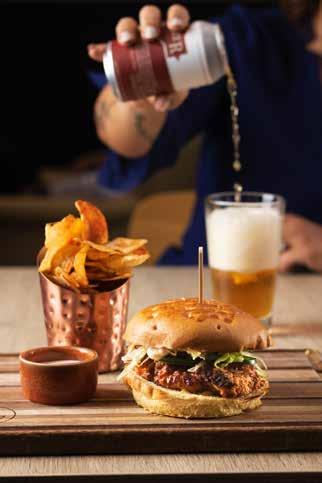




Over the last decade or so, consumers have generally become much more conscious about which kinds of waste we send to the landfill and what gets reused, recycled, or, increasingly, upcycled. The compost bin has become a guilt-free spot to park coffee grounds and other food waste, but it turns out that there may be an even more efficient destination for those used coffee beans.
Shawn Leggett, the President and founder GroundUp Eco-Ventures, a start-up based in Okotoks, turns used coffee into cosmetics and flour — the kind of flour you can bake with. To bolster his company, he’s doing the same with the spent barley that comes from Alberta’s ever-booming craft beer industry.

Leggett’s career started in the oil and gas industry, in which he worked for over two decades before deciding he wanted to try something new. After some extensive research, he saw a strong future in the world of upcycling — that is, taking something that other people might see as garbage and turning it into new, useful products. He saw plenty of room in the Alberta market to launch a local venture and two years ago, GroundUp was officially born.
“In about 2018 I started researching circular economies and upcycling,” Leggett says. “I thought it was such a great idea and saw a lot of things happening globally, but not much happening regionally. I just like the positivity of everything that we do.”
Other upcyling companies around the world are doing everything from turning plastics into shoes to making toothbrushes from old yogurt containers, but Leggett wanted to do something
a little bit different by using organic matter — namely, coffee and brewery by-products, and was interested in the skin care properties of coffee oil. As it turns out, those coffee grounds left after you’ve brewed a pot are full of extraordinary oils full of antioxidant and anti-inflammatory properties. Leggett liked the idea of making coffee-oil rich beauty products, but even after the oil was extracted, there was still plenty of matter left and he wanted to go as close to zero-
waste as possible. Milling the leftover grounds into flour seemed like the best way to turn them into a viable product.
GroundUp makes two different flour products: one with the coffee post oil-extraction and another from spent breweries grains (Leggett calls them “saved grains”), a by-product that Alberta has in abundance and is most commonly repurposed as livestock feed. The brewer’s grain flour is likely a more familiar product to most people. GroundUp sticks to a
barley-based mash that come with a natural pre-loaded nutritional content after the brewing process.

“Brewing beer makes barley better,” Leggett says. “The brewers pull out the sugar and starches and the percentage of all the good stuff in the grain goes up. You end up with a flour that's full of dietary fibre and protein, sugar-free, and with higher levels of iron, prebiotics, and antioxidants.”
Since the coffee flour is a new concept for most people, Leggett recognizes there’s a barrier in that many potential customers will have no idea what to do with it. The nutritional value means it’s a good addition to a smoothie or yogurt bowl, but it can also be used for baking in tandem with the saved grain flour or more traditional flour. To help customers get the hang of the alternative flours, GroundUp also makes a packaged brownie mix that utilizes both the coffee and saved grain flours and a pancake flour with the saved grain flour. More premixed products are on the way.
“The flours are very functional,” Leggett says. “Obviously, the grain flour more than the coffee flour. You can start having four to five grams of protein and eight grams of fibre in something like a chocolate chip cookie. It’s about making your guilty pleasures less guilty.”


Leggett is excited about what’s to come and already has ideas for developing technology to transform other so-called waste into food and beauty products. Leggett has his eye on developing oils and products made from avocado seeds and other products that typically end up in the trash. As far as he can see it, the sky’s the limit.
The coffee flour, made from grounds sourced from a local cold brew company, is a more unusual product, though it’s one that is gaining traction in health food circles. That flour is also high in protein and fibre, with a boost of potassium. The flour doesn’t taste like coffee per se, but has a faint nutty and chocolatey flavour.

The other surprising thing about GroundUp’s products is that they’re all moderately priced, giving people a chance to try these new flours without making a substantial investment. Single kilogram bags of flour are priced at around the $10 mark and are available through the GroundUp website, Calgary Co-Op, Safeway, Sobey's, and Community Natural Foods stores, with more retailers expected to come on line in the coming months.
“I was looking for something unique and cool and I just started falling in love with the principles of upcycling,” he says. “Now I can't look at anything without thinking ‘What can I do with that?’”
For more information on GroundUp Eco-Ventures or to order its products, visit groundupev.com.
Cookbook author and regular contributor to CBC Radio, Elizabeth is a Calgary-based freelance writer, who has been writing about music and food, and just about everything else for her entire adult life.
month, bruschetta is a relatively quick and easy starter, and perfect for showcasing those delicious, fresh tomatoes that will be ripening soon. We’re lucky, however, to have terrific, tasty tomatoes available to us for a much longer time with our greenhouse growers extending the season.
Let’s take a deeper dive into this ubiquitous dish and learn a little more:
• Firstly, let’s say it correctly – it’s pronounced "brusketta" in Italian.
• You might think the name is the tomato topping, but the word comes from the Roman “bruscare”, which means “to toast” or “roast over coals” and refers only to the toasted bread. It was originally a way of using up bread that was going stale.
• In Tuscany, they would call it Fettunta (“la fetta unta” or “the oily slice”) and without any toppings, it would be used to taste the first olive oil of the year in November.
• Bruschette (the plural of bruschetta) can have a variety of toppings; you could use vegetables such as peppers or snap peas, salumi, broad beans, or cheese.
• Some might like their tomato topping spicy and add chili peppers or flakes, and some might like more herbs and add Mediterranean flavours of oregano, rosemary, or thyme.
We know there are many excellent examples of bruschetta on Alberta restaurant menus, and we asked three of our favourites how they made their versions taste so good.

Many thanks to Chevonne Centini, owner and restaurant director of Centini Restaurant and Lounge; Chef Willow Eaglespeaker, Chef de Cuisine at The Little Chief Restaurant at Grey Eagle Resort & Casino; and Chef Chris of The Kitchen at Schott’s Lake, for generously sharing their recipes, and some sage advice for us home cooks.
“The bruschetta we make at the restaurant is made from tomatoes of incomparable quality. I love the ones from Paradise Hill that Co-op carries,” says Chevonne Centini.
“I know the magic, as always, is in the skill with the knife and getting those pieces cut uniformly at just the right size — something we are maniacal about in the kitchen! Essentially, bruschetta is nothing more than finely diced tomatoes, good quality sea salt or kosher salt and olive oil, again - quality being key.”
Serves 3-4
4 vine-on tomatoes
½ shallot, finely chopped
¼ tsp fresh cracked black pepper
½ tsp salt
5 basil leaves, finely sliced
2 Tbs (30mL) extra virgin olive oil
1. Using a serrated knife, cut your tomatoes into small 6-7 mm cubes.
2. Mix with salt, pepper, finely chopped shallot, basil, and EVOO. Mix then taste, adjust salt, pepper and oil to your liking.
3. Serve on toasted crostini with balsamic reduction drizzled on top.
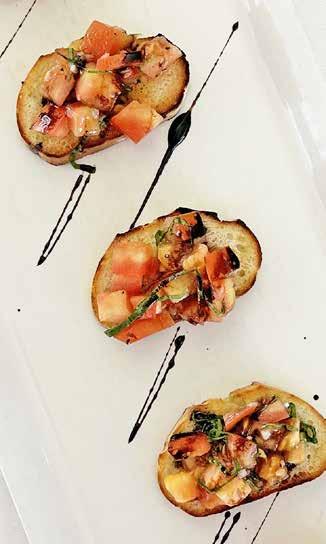
“I was thinking about ideas while creating my menu, and decided to recreate a fan favourite of the hotel (Grey Eagle). My idea was to showcase the bruschetta flavours that people love, but express them creatively,” explains Chef Eaglespeaker.
“While brainstorming, a few ideas came to mind that I would use: different tomatoes to complement sweetness and acidity, and rolling house made ricotta into little balls the size of bocconcini, then into tomato powder that we make
from dehydrated tomato ends, which gives us a creative use for waste too.”
Serves 2-3
150 g cherry tomatoes, halved
10 g garlic, finely minced
2 g basil
To taste salt and pepper
5 tsp (25 mL) olive oil
5 tsp (25 mL) red wine vinegar
125 g (1/2 cup) ricotta
2 tsp tomato powder
Pinch salt
Drizzle balsamic glaze
Drizzle olive oil
Handful chervil
20 g pickled onions, thin sliced
1. Fold together your tomatoes, garlic, and basil, then season with salt and pepper to taste.
2. Toss together with olive oil, then introduce the vinegar to the mix, adjust seasoning as desired and let marinate.
3. Roll ricotta into 25 g balls, then combine tomato powder with salt, and roll the ricotta balls in the seasoning.
4. Neatly arrange the bruschetta with the ricotta balls, drizzle olive oil and balsamic glaze over the bruschetta, and garnish the dish with a handful of fresh chervil and pickled onions.
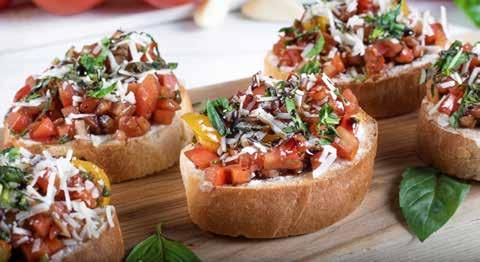
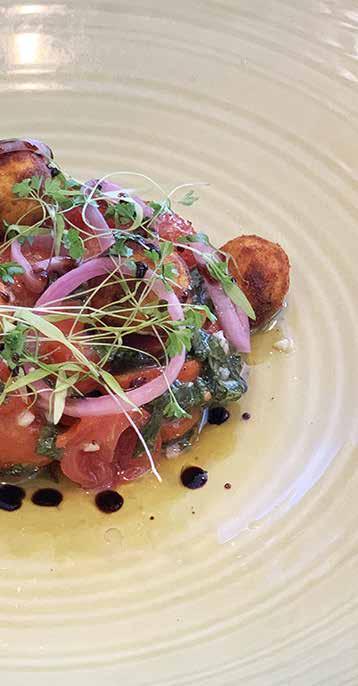
“I love great tomatoes, and The Great Greenhouse Company, a small familyowned and operated business here in Sundre, has some of the best I have ever tasted,” says Chef Chris.
“This is a dish that I love to share with my family and friends. Use fresh, ripe tomatoes and spend a little extra on high quality olive oil and a good aged balsamic.”
Serves 3-4
280 g vine ripened tomatoes, small dice
40 g red onion, small dice
4 g basil, chopped fine
7 g garlic, minced
2 Tbs (30 mL) balsamic vinegar
½ tsp salt
2/3 cup (160 mL) garlic oil
½ tsp pepper
Sprinkle of parmesan, for garnish
Drizzle of balsamic glaze, for garnish Micro basil, for garnish
1. Add tomato, red onion, basil, and garlic to a stainless-steel bowl.
2. Add balsamic, salt, garlic oil, and pepper, stir and let marinate for one day.
3. Strain and serve on toasted crostini with a sprinkle of parmesan and a drizzle of balsamic glaze. Garnish with micro basil.

There’s a new label in town, and it’s attracting a lot of attention. In reality, this is about more than one town, and the attention is well deserved. The newest label on shelves is Made in Alberta, a voluntary program introduced by the Alberta government to help identify locally made products. For the province’s
food and beverage producers, the label is a way to assure customers their item is Alberta-made. Whether at the farmer's market or in a store, the label shines a light on what’s made in our own backyard making it easy for us to choose local.




The labelling program is a significant step towards promoting and supporting
locally made food and beverage products in the province. Made in Alberta is administered by the Alberta Food Processors Association (AFPA), a non-profit organization established in 1974, that represents all segments of the province’s food and beverage producers. It’s the voice for more than 250 food
growers, processors, retailers, foodservice buyers, and suppliers on matters pertaining to promotion of the Alberta food processing industry. At a time when the online world is at our virtual doorstep, finding ways to help consumers support local food growers is something that aligns nicely with AFPA’s mandate.
The Made in Alberta program was created by the Alberta Ministry of Agriculture and Irrigation, recognizing the importance of supporting local food production and promoting Albertamade products. “This new voluntary label celebrates the safe, high-quality agricultural and food products that Alberta is known for here and around the globe”, says Minister Nate Horner. “It will help consumers more easily identify Alberta products so they know their hard-earned dollars will stay in our province and support other Alberta families.”
As a voluntary program, the Made in Alberta label means those food producers who apply for it are choosing to put extra effort into getting their products into the hands of those of us looking specifically to support local, whenever and however we can. The “Made in Alberta program provides opportunity for our members, including growers, producers, and processors”, says Eric Haak, Boar Chair of AFPA. “By promoting the diversity of Alberta-made products, we can create new opportunities for Made in Alberta companies to grow their businesses and connect with consumers who are looking

for locally sourced food and beverages.”
When we hear about food security and supply chains, larger-scale manufacturers in distant places often come to mind. What can we as individuals do to affect change in such a large and complex equation? Well, the choices we make each day can help strengthen our own supply chains and help support communities close to home. The Made in Alberta labelling program helps to create a more sustainable and resilient food system in the province while supporting local businesses and economic growth.
“When you support local you support your neighbour”, says Bianca Parsons, Executive Director of AFPA. “Our members are incredibly philanthropic; supporting them by purchasing a Made in Alberta product also supports our community. It’s not just about the delicious product – these businesses are the ones that donate to local charities and give back to kids’ sports teams. Buying Made in Alberta helps these businesses employ more Albertans and that creates a stronger Alberta for everyone.”

Association members are enthusiastic about the partnership between the Alberta government and AFPA. “We are thrilled to be part of the Made in Alberta program”, says Paige Wolfe of Peace River Honey in Guy, Alberta. “Our location in the Honey Capital of Canada is rooted in everything we do, and we are proud to showcase that.” The program demonstrates a clear commitment to promoting locally made
products and supporting the agriculture sector in Alberta.
The impacts of this program have an even wider reach, like ripples on a pond. “Choosing locally made products also has environmental benefits”, explains Parsons. “When products don’t need to be transported long distances it reduces the carbon footprint associated with transportation.” Part of creating a sustainable and resilient food system includes looking at how we physically move goods to service; local products travel a shorter distance to get to our shelves and into our homes.
When we buy from a local business, we see the direct impact of our actions. “Red House Salsa is excited to be part of the Made in Alberta campaign”, says Mary Burch of Red House Salsa in St. Albert, Alberta. “When customers choose to support a local business, they create a positive spending loop that enables everyone in Alberta to thrive. Supporting local farmers and agriculture helps hard working Albertans stay in business, find stable jobs, and boosts our economy.”
Overall, the Made in Alberta program is a significant initiative that supports local growers, producers, processors, and consumers. By promoting locally made food and beverage products, the program helps build a sustainable and resilient food system in Alberta while providing new growth opportunities for local businesses to thrive. Be sure to look for the Made in Alberta label on a shelf near you.
What is the easiest way to make a banana split? Cut it in half…!
But seriously, this fruit has got it all going on. Nutritionally, it’s loaded with antioxidants for overall good health, fibre for better digestive health, vitamin C, niacin, copper, vitamin B6, potassium and magnesium which all help keep the body functioning optimally - plus it comes with its own yellow suit.
Not only is this fruit fun and healthy, but it also has been featured in many song titles and words over the years. Gwen Stefani “Hollaback Girl”, The Terry Twins with “Chiquita Banana”, and Harry Belafonte’s classic “The Banana Boat Song”, to name just a few hits for this famous fruit.
Whether green, red, blue (yes blue) Java bananas or the most well known yellow (Cavendish), bananas are enjoyed all over the world. Not all grocery stores carry the red banana, when you see it buy it; it has a lovely, sweet banana taste that is slightly different to a yellow banana. It is also higher in nutrients and can be eaten as a dessert, on its own, or used in any recipe that asks for a ripe banana.
The blue Java Banana has a blue tinged peel due to its natural wax coating which fades as it ripens. These bananas also have a slightly different taste that reminds you of vanilla pudding. These beauties are primarily found in Southeast Asia though. Bananas make a great addition to yogurt, cereal, and smoothies. Keep some peeled, cut and frozen so that with just a
quick whip in the blender you can enjoy your own banana “ice cream” in minutes. You can use them as a replacement for sugar in baking and cooking. Bananas are easy to eat and transport. All you need to do is peel them and you’re good to go.

Milkshake
Serves 1-2
2 medium bananas
10 pieces pineapple chunks
1 cup (240 mL) coconut cream
¼ cup (60 mL) pineapple juice
1 cup ice cubes
1 Tbs (15 mL) honey
1. Peel and slice the bananas and put in the freezer to freeze along with the pineapple chunks.
2. In a blender, add the frozen bananas, pineapple chunks, coconut cream, pineapple juice, honey and ice cubes. Blend until smooth.
3. Taste and adjust to desired sweetness.
Note:
For a chocolate version, remove the pineapple chunks and juice and replace with cocoa and adjust sweetness to your taste.

Serves 1
1 croissant
¼ cup + 1 Tbs (75 mL) mascarpone
½ tsp cinnamon
1½ tsp brown sugar
1 banana
1 Tbs dark chocolate, roughly chopped
4 walnuts, roughly chopped
1. Slice croissant in half lengthwise and toast.
2. In a small bowl, combine mascarpone, cinnamon, and brown sugar.
3. On the bottom of the croissant spread the mascarpone mixture.
4. Peel and slice the banana lengthwise and place on top of the mascarpone. Add the chocolate and the walnuts. Top with the other half of the croissant.
5. Devour!
Ice Cream
Serves 2
2 bananas (or 3 if using red bananas)
1½ Tbs butter
1 tsp sugar
2 tsp (10 mL) rum
2 scoops vanilla ice cream
Caramel sauce and raspberries, for garnish
1. Peel and slice bananas into 2 cm chunks.
2. In a small pan, add the butter and let cook over medium heat until it starts to brown 2 - 4 minutes.
3. Add the sugar and stir until sugar has fully melted. Add the rum and stir to combine.
4. Lay the bananas in a pan and let cook 1 - 2 minutes and then gently turn and let the other side cook 1 - 2 minutes.
5. Gently remove from pan into your serving dish. Add a large scoop of vanilla ice cream and garnish with caramel sauce and raspberries.

Garnish with orange zest.
Have you seen plantains in the grocery store? They are those large, green, not-so-round bananas. They’re most likely the Macho Plantain. These fruits are starchier and lower in sugar than regular bananas which makes then great for cooking. As they ripen they will get sweeter.
Serves 2
Oil
1 green plantain
Pinch sea salt
1. In a medium pot, add enough oil to fill the pot halfway. Preheat oil to 350 – 375º F.
2. Meanwhile, cut the ends off the plantain. Slice through the skin in a line from the top to the bottom of the plantain.
3. Use your fingers (and a knife as needed) to peel back the skin from the plantain. This may be difficult at first but gets easier as you go along. Cut the plantain on a diagonal approximately 2.5 cm thick.
4. Gently place the plantain pieces in the hot oil (being careful not to overfill the pot) leaving room for the oil to bubble up. Fry plantain 2 - 3 minutes, turning halfway
through. Remove from the oil and place on a cutting board.
5. Using the bottom of a juice glass, smash each plantain to half its original thickness. Return plantain to the frying pot and let fry another 3 - 5 minutes or until plantain has reached a light brown colour.
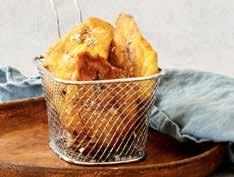
6. Remove from the fryer and place on a paper towel. Sprinkle with sea salt.
Now what can you do with these plantains once you have fried them? Other than quickly eat them all yourself.
• They are excellent as the base for nachos.
• They complement a dish of black beans, shredded beef, sautéed sweet peppers and avocado.
• They make great slider “buns” for your next pulled pork and coleslaw slider.
• They can be used to scoop up your favourite dip. Colombians love them with guacamole and hogao.
Be adventurous!
From farm to flask, grain to glass, and crop to cocktail, Alberta craft distillers are adding value to our province’s bounty, in bottles as opposed to barrels, and shortening the distance from soil to still.

Alberta farmers produce close to half of all barley and a third of all wheat in Canada, and despite deep agricultural roots and a long history of distilling — especially rye whisky — the province’s nascent craft distilling industry continues to evolve. In 2015, just three craft distilleries were producing spirits from local grains, today there are more than 60 distilleries in all corners of the province.

“Alberta produces the best barley in the world,” says Stavros Karlos, Executive Director of the Alberta Craft Distillers Association. “The barley we produce and malt in this province is exported
BY ADRIANNE LOVRICto Scotland to produce Scotch, and to the U.S. as a critical part of their beer making industry, so we have a long history of exporting raw materials to other countries who turn them into alcoholic products.”
Many of Alberta’s craft distilleries get their start producing clear spirits such as vodka and gin, since Canadian standards require whisky to be aged a minimum of three years. For a number of producers, their time has arrived and they are releasing anywhere from three to six-year-old whiskies. Although Canada’s minimum aging requirements have slowed release dates, they haven’t impeded innovation; looser definitions around mash bills have led to craft distillers making new and interesting products in the whisky category. “We’re just on the cusp of this flood of Alberta
eight years. “It’s always a fun time to be doing something first — terrifying with a lot of trials and tribulations — but this is the best province for growing barley,” says Quinn. The malting barley used for Eau Claire’s vodka, gin, whisky and seasonal spirits is sourced from a local grower, and Eau Claire also farms about 20 acres employing horse farming, traditional methods and antique equipment to produce special edition whiskies. The advantage to sourcing locally is control. “We know when all the grains were harvested and all within 150 kilometers of our distillery. And with our location at the base of the Rockies, we’re using the cleanest, freshest water, which helps the whole process.”
Alberta’s climate is also a big influence on the flavour profile of our whiskies. Altitude affects the distillation process — boiling off at a lower temperature yields lighter flavours in the distillate. As well, lower humidity leads to losing more water as opposed to alcohol — known as the angel’s share — over time. Finally, wild temperature swings make the alcohol expand and contract more often in the barrels, extracting as much flavour as possible and making the sprits more complex, more quickly. “As we become more focused eating local produce and meat — why wouldn’t you want your whisky to be like that too? You know where our barley came from, you know where it’s being distilled, where the barrels are kept


during the aging process, you know we’re packing it all on site, you can come and see for yourself,” says Quinn.
repurposed flare stack burner from an oil and gas company.
“We have access to this incredible potential that would make people in other parts of the world, and other parts of Canada jealous. We have the infrastructure, we have the grain growing potential, capacity, knowledge, and know how. The last step is adding the value right here at home instead of exporting it for others to add the value.”
One of the newer entrants to the craft distillery scene, Anohka, just west of Edmonton, has been producing awardwinning gin, and recently purchased a 110-acre farm to grow their own grains for their whisky production process, which is also a made-in-Alberta solution. “What sets us apart is that we’re the only distillery using direct fire to heat our stills,” says Gurpreet Ranu, Anohka owner and master distiller. Anohka’s fire source? None other than a

A trip abroad to a country importing Alberta barley, and a visit to a local Scottish distillery sparked a similar thought for southern Alberta-based Pivot Spirits owner and distiller Lars Hirch. “I didn’t think a Scotch distillery tour would change my life, but it sure did. When they said at the start of the tour that all you need to make Scotch is barley, yeast and water, that got me thinking right away that it might be a lot more fun and maybe more lucrative than feeding barley to my cows.” Shortly thereafter, Hirch started growing five different grain crops on his family farm: a feed variety of barley; rye; soft wheat; triticale; and spelt, with the plan to showcase and someday hopefully get some recognition for the terroir of spirits grown in the arid irrigation district of southern Alberta. “We’re really highly productive and we have some speciality crops that can’t be grown in other parts of the province. We’re quite hot and dry, and the grains as a result when turned into spirits have their own unique terroir.”

Pivot has made good strides, winning multiple awards with additional merit given to their spirits’ clear sense of place in their expression. “I feel that one of the advantages I have as a farmer who grows grains is that I know them really well and I can provide a lot of different types of spirits from them,” says Hirch. “It’s kind of a luxury most distillers don’t have. Experimenting and trying new ideas is less cumbersome and more convenient. I don’t have to worry about supply, and it leads to being able to make a really consistent product too.”
A desire for consistent premium products using local ingredients was also the inspiration for Calgary’s Two Rivers and Bridgeland distilleries. Both distilleries source their raw ingredients from local growers - near Strathmore for Two Rivers, and Alix and Taber for Bridgeland, to produce a variety of awardwinning spirits. “Everything is small batch. We’re hands on every step of the way from loading up mills with grains by hand, to pulling spent grains out of the mash tun by hand, to loading everything into the still by hand, to bottling, labelling, and packaging by hand. Not a lot of things in a distillery of this size are automated. But I truly believe when you have hands on in every part of the production process, you will turn over a much better sprit. Our quality control is second to none because we’re literally putting every drop of premium alcohol into a bottle,” says Two Rivers Distillery founder, Mark Freeland.
Bridgeland Distillery co-owner




and distiller, Jacques Tremblay, also acknowledges their grain suppliers’ commitment to quality assurance. “It goes a long way when you can work closely with the people who are growing the grains that you are using and they can help select different types of grains and roasts when they do the malting, to highlight the flavours we want when we distill. If your raw ingredients are not the best quality, then you are missing out on something.” Working directly with small craft grain producers is also critical for innovating new products. “We like to follow tradition, but innovation is at the heart of everything we do,” says Tremblay, as he looks forward to a September release of a new “single blend” of their award-winning Glenbow single malt and
Taber Corn Berbon.
Using local wheat as a base for their neutral grain spirit, Vermilion’s Copper Cork Distillery is turning out unique products that reflect the vastness of the wheat-rich prairie around them. “Locally made vodka does have a unique flavour. Wheat adds a very slight sweetness to it,” says Todd Ree, managing partner and distiller at the Copper Cork. With consistently available base grains in a bin not far from the distillery, Ree and his partners are turning out sought-after specialty flavoured sprits and liqueurs. “We’re proud of what we make and how it tastes. People really like it and they are surprised we are able to make products like this right here in Vermilion.”

CFM West
Wed-Sat: 9-7



Sunday: 9-5
Stoney & 16th
CFM South
Thurs-Sun: 9-5
Blackfoot & Heritage

WithEdmontonCommunity Foundationsupport,the ShumkaDancerscarryforward acenturies-oldUkrainian tradition,honouringand expandingthestorytellingroots ofthishigh-energyand colourfulartform.As representativesofthethirdlargestUkrainianpopulationin theworld,theShumkaDancers presentajoyfulcelebrationof ourdiversity.

DonationstoECFinspirehope,create opportunityandenhancetheEdmonton lifestyle.Weworkwithourdonorstogive, growandtransform. ecfoundation.orgisa prouddancepartner.

 CharitybeginsatHome.
CharitybeginsatHome.
 STORY AND PHOTOGRAPHS BY RENÉE KOHLMAN
STORY AND PHOTOGRAPHS BY RENÉE KOHLMAN
If you want to sound posh, just tell your dinner guests that you’re serving a seafood bisque for dinner. Guaranteed they’ll accept your invitation without a minute of hesitation. If you’re a purist, you know that a true bisque is a seafood soup, but it’s a term often used to describe any creamy, puréed soup. The origin of the word “bisque” is not super clear, but it’s likely derived from the word Biscay, as in the Bay of Biscay, a gulf that lies off Europe’s west coast, bordering between France and Spain.
Traditionally, a bisque is thickened with a paste made from crustacean shells. But, if like me, you have no desire to pummel crab and shrimp shells into oblivion, you can simply use good ol’ all-purpose flour. I took another shortcut and used chicken broth instead of a seafood broth. This is because I used canned crab and already shelled shrimp for my bisque. If you would like to cook your own crab and shrimp, by all means reserve those shells and make a delicious broth. You’ll want to cook the shells with butter, onion, celery, peppercorns, and bay leaves, until everything is brown and toasty. Deglaze the pan with sherry or wine, then add a good amount of water and simmer for a couple of hours until the broth has reduced by quite a bit. This is also a fantastic way of reducing kitchen waste, which is always on top of mind for me.
I know what you’re thinking: Renée, this soup is pricey. And, you’re right, it totally is. But it’s also fairly adaptable when it comes to the seafood used. If you spot a deal on small, cooked bay scallops or lobster (ha ha ha, I know), or even any firm, flaky fish, then go ahead and use those options instead. I always keep my eyes peeled for deals on shrimp, and stock my freezer when the price is hot.
And, given its posh profile, I like to serve this on special occasions or when I’m feeling fancy and want to use the pretty dishes and silverware. This soup is a reminder to use the good stuff, both when it comes to ingredients and tableware.
What I like about this soup is that it’s light and lovely, perfect for summer dining on the patio. There is a bit of heat, thanks to the hot sauce, but feel free to
dial it down, or up, as you see fit.
All in all, the technique (with shortcuts) is really simple and the soup can be made in 30 minutes. A couple of tips though. Be sure to have the vegetables chopped fairly small (save the big chunks for chowders) as they’ll be incorporated into the roux (melted butter and flour) easier. And the sherry isn’t optional. You don’t have to use the most expensive bottle; heck, even the stuff from the grocery store will do. But its fortified flavour brings an essential nuance to the bisque.
I keep the garnish simple with parsley and green onions, and for visual appeal, one can add pieces of seafood to the top of the soup as well. Serve bowls of bisque with good, crusty bread, or homemade buttery biscuits. Oyster crackers or crostini are also classic companions.

Serves 4-6
2¼ cups (560 mL) butter
1 onion, finely chopped
4 celery stalks, finely chopped
2 bay leaves
2 garlic cloves, minced
¼ cup all-purpose flour
4 cups (1 L) reduced-sodium chicken broth
1½ cups (375 mL) whole milk
3 Tbs (45 mL) dry sherry
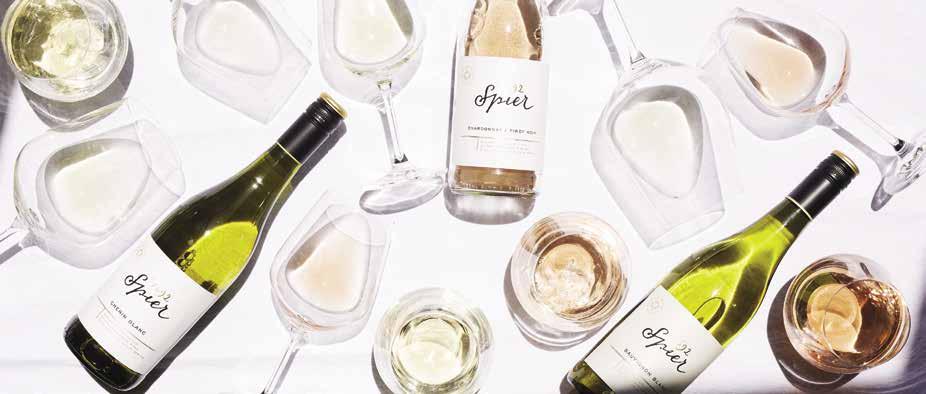
1 Tbs (15 mL) ketchup
2 tsp (10 mL) tomato paste
¼ tsp smoked paprika or Old Bay seasoning
1 cup (250 mL) whipping cream
1 tsp (5 mL) tabasco sauce
454 g cooked lump crabmeat, canned, frozen, or fresh
454 g cooked shrimp
2 green onions, thinly sliced
3 Tbs chopped parsley
1. In a large soup pot, melt the butter. Add the onion, celery, and bay leaves and cook over medium heat until softened, about 5 minutes. Stir in the garlic and cook for a minute longer.
2. Stir in the flour and cook, stirring constantly, for 2 minutes. Gradually whisk in the chicken broth and bring to a boil. Simmer uncovered, stirring occasionally, until the broth is thickened and the vegetables are soft, about 15 minutes.
3. Add the milk, sherry, ketchup, tomato paste, smoked paprika, and tabasco. Bring to a gentle simmer, and season with salt and pepper.
4. Stir in the crab and shrimp. Discard the bay leaves. Stir in the green onions and parsley, reserving some for garnishing the bowls.
5. Simmer until heated through. Divide into bowls and garnish. Serve with crusty bread or crostini.
Leftovers can be refrigerated for up to three days, and if you would like to freeze portions, be sure to do so in airtight containers and reheat very gently over low heat to prevent curdling.
Renée Kohlman is a busy food writer and recipe developer living in Saskatoon, Saskatchewan. Her second cookbook, ‘Vegetables: A Love Story” has just been published.
With the warm weather finally here after what felt like the *longest winter ever, it seemed like a very good time to talk about the summer sippers. Those summer friendly, hot weather, patio, or deck, all-stars that help us relax, unwind, or even socialize with good
company. Several of our picks for this summer are in mix or sample packs, but most are also available in a single flavour if you find that new favourite. We’ve picked a few beers as well, and in some cases, we’ve focused on beers that are alcohol or gluten free to keep things fresh, or help out those who are
Clever! These new cocktails from Canmore’s Wild Life Distillery taste just as you hope from the name on the can. Being a fan of both gin and margaritas I couldn’t wait to try Thirsty Cougar Gin Margarita, and it delivers – just gin, lime, orange, and agave is evidently all you need. Problem Bear Rhubarb Spritz is also a gin base, blended with carbonated water, rhubarb, and strawberry – two eminently crushable cocktails!
CSPC 869689 and CSPC 869692, $14 (4-pack cans)
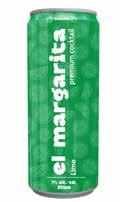

Entirely approached as a cocktail first drink rather than, “what can we do with our vodka/or other spirit?”, come the El Cocktails. The margarita is probably better than the ones you can make at home with premium tequila, triple sec, lime and a little sugar – this is no naked or nude style cocktail - and is a great balance of zesty lime and big tequila. Great ice cold or served over ice too.
CSPC 880905 $14-16 (4-pack cans)
A paloma can be a bit of a heated argument around my house, as it really boils down to if one likes grapefruit in their cocktail. Made the right way – about 7 percent alcohol with plenty of palate searing grapefruit, blanco tequila, sugar and lime. It’s a doozy (there is a lot of grapefruit) but a nice little kicking back drink for the summer.
CSPC 880908 $14-16 (4-pack cans)
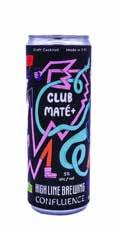

A collaboration between one of Calgary's first breweries and first distilleries, this gluten-free energising vodka cocktail is popular with dance clubbers, and made with yerba mate – a herbal South American tea, along with lemon and cherry extract. It’s on the sweeter side, but not too sweet, and a clever combination of earthy flavours from the tea, and citrus with cherries. CSPC 880905 $16 (4-pack cans)
abstaining or those who have to avoid a few things.
*Subject to actual fact checking
Find these refreshing beverages by searching the CSPC code at Liquorconnect.com; your local liquor store can also use this code to order it for you. Prices are approximate.


Mexico
Sometimes, tequila is the only thing that really hits the spot. A nice blend of tequila and soda with a splash of lime, the tequila packs a bit of a punch, and if serving in a glass, you might want an extra slice of lime as a garnish, but in the can, it’s got good balance with being quite dry, and tequilaforward too.
CSPC 826614 About $14-16 (4-pack cans)
Pivot Spirits Hard Kombucha, Alberta Collabs seem to be the trend these days, and we fully support it! Medicine Hat’s Your Preference Kombucha has teamed up with Rolling Hills’ Pivot Spirits to create bright and tangy, hard kombuchas in two flavours: Blood Orange Peach Vodka and Blueberry Haskap Vodka. The fruitiness plays with the tartness of the kombucha to give a refreshing drink that’s sweet and sour – and perfect for summer.
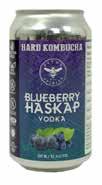
CSPC 883911 and 883912 $24-25 (4-pack cans)


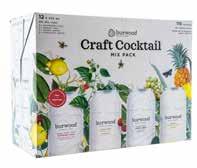
Burwood distillery has carved out a fine reputation around these parts for some well-made and finely crafted spirits, and they are making some waves with their newer RTD and cocktail-style beverages too. We tried the mix pack and found that there was a little something for everyone; the Pineapple Lemon Gin Soda (our favourite), the Grape Lemon and Raspberry Basil in the seltzer style, and a sunshine friendly Mango Lime.
CSPC 869173 $30-32
It’s always tricky to try gluten-free beer since, by definition, they are missing something that makes beer…well…beer. We tried both the IPA and the pilsner and were suitably impressed. A little darker and nuttier than expected but still tasty, it has the flavour and texture beer drinkers want. A special enzyme in production targets gluten protein sites that can react with celiac disease sufferers, making a liquid with less than 10 ppm.
CSPC 886084 (IPA), and CSPC 886083 (Pilsner) both 4-packs, around $16-18


The Vacay Brewing Company seems to have summer vacations on their mind with a number of juicy, fruity, and summer smashable brews and drinks in the lineup. A standout favourite from the line was the Crouching Tiger with good balance of lighter, rice notes and a clean, smooth drinking approach – and finish. Bring on summer! Brewery (for now), $16-18
We’ve had some serious praise for the Founder’s Originals (including at the Alberta Beverage Awards), so we are happy to share that the whole gang is here and ready to go. Newest is a fun and tasty play on a mule with bright, juicy, crushed pineapple style fruits and sweet flavours, but that spicy, ginger-laden kick creeps up on you and before you know it, one is like, “damn, that’s a little spicy!”
CSPC 874808 About $25-30
Our friends at Village keep bringing out the hits with their non-alcoholic Pale Ale, which is catching some post-activity time around here. Fairly light in body with a mild hoppy character and some tea leaf and a clean, mildly bitter finish, this is a nice way to relax in the sun without the alcohol.
CSPC 852407 $12-13 (4-pack cans)


Partake is making some of the best non-alcoholic beers in Canada and we were very pleased to see the hefeweizen landing in Alberta. Slightly cloudy in the glass with plenty of wheat-y goodness and a bit of texture too. Very light, and lacking in a bit of body, but cold on a nice day… it would be very welcome indeed. $30 (12-pack cans)

Hefeweizen, Alberta
Wow, there’s no mistaking the flavour of this beer! Just the aromas of this German wheat beer will give it away - it’s peachy through and through. But that’s no surprise as Wild Rose have added peach and apricot puree to their hefeweizen. And bonus, it’s their signature beer for a cause with proceeds going to Chimo Animal Assisted Wellness and Learning Society (CAAWLS) in support of mental health.
$14 (4-pack cans)
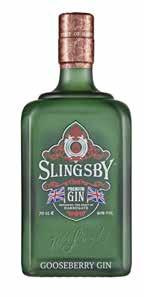
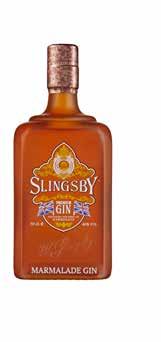
Harrogate, in North Yorkshire, England, is a spa town - its fame coming from the benefits of the natural spring water, discovered by William Slingsby in 1571. Slingsby gins use water drawn from the Harrogate Aquifier, along with local botanicals, single grain spirit, and in this case, Yorkshire orange marmalade to create a really delicious, almost mandarin, sweet citrus gin, that sips as well on its own as it does in cocktails - try a Marmalade Martinez!
CSPC 847269 $49-$54

The Bard Distillery, USA
Thomas Bard is the 4th great grandson of one of brothers who founded Bardstown, Kentucky, (aka the Bourbon Capitol of the World), and their Founder’s Select is their choice of just three barrels of their Cinder & Smoke - corn, rye, and malted barley bourbon - blended (and signed). With just a few drops of water this outstanding, eminently sippable whisky opens up to reveal flavours of vanilla, baking spice and soft mandarin peel.
CSPC 864286 $145-165
My dad loved gooseberries, and as kids in England, we all hated ‘goosegogs’ as we called them. They’re tart and would be made into tarts, fools, and crumbles – but I think I’ve found a way to enjoy them! Spirit of Harrogate have cleverly added them to their citrusy London Dry Gin (that has a grapefruit base) to produce a sweeter, tangy version – fresh and fruity on its own, really good with tonic and a little apple garnish, or with fino sherry for a terrific martini!
CSPC 847274 $49-$54

Ooh ooh ooh, I’m in dreamland when I just smell this whisky. Made by master distiller, Chris Molyneaux, in Speyside, and aged for a minimum of eight years, this is a super smooth, and totally delicious whisky where the proceeds go to restore the peatlands (and you get your very own carbon offset certificate), as 94 percent of UK peatland has been damaged or destroyed - yet it covers 20 percent of Scotland. Creag Dhu is toffee and buttery - and you’re not sharing mine!
CSPC 854544 $81-84
Glenmorangie 10-Year-Old, Highlands. Scotland

It’s a brave move to take a much-loved whisky that’s 180 years old and change the appearance of the bottle, and it takes a certain confidence to unleash this vivid, bold design to enthusiasts. Yet here’s the new curvaceous bottle with the giraffe moved to the back of the bottle (they are the tallest stills in Scotland!), and the same peachy lightness and finesse, with those soft, creamy vanilla notes we enjoy and expect of this classic Highland Single Malt.
CSPC 750257 $75-80
Patrón El Cielo, Jalisco Highlands, Mexico
What happens when you take a tripledistilled iconic tequila and distill it a fourth time? You might expect there’d be little to no flavour left, but after more than 150 tasting sessions, luxury tequila brand, Patrón, have pulled it off and elevated their Silver tequila to yet another level –then dressed it in a beautiful bottle and box. It needs nothing but a little ice and a slice of orange for a stunningly smooth and mouth-filling, bright, fresh and sweet sip of joy this summer.
CSPC 884387 $250

How on Earth is it June already? Did the first half of the year just fly by for everyone – or just us? By now, we should be firmly enjoying our summer months, our jacket-free, growing season for garden and glade, but also enjoying our natural environment too. This month, we had so many things we wanted to cover, we couldn’t narrow our lists down to a single page, so we’ve recommendations from local and far-ranging whiskies to weird and wonderful English gins, but also some summer sippers of a sort for the campsite, poolside, and backyard too. Enjoy!



From Ireland’s oldest city, Waterford, in the south-east of the country, comes this London Dry style, small batch gin from the Blackwater Distillery. It has an intriguing nose; we can identify the juniper, and then there’s layer upon layer of cinnamon, coriander, and citrus, that combine to produce more floral notes. No. 5 is a soft gin in the mouth that is just perfect with a splash of tonic to tone down the peppery finish.
CSPC 782716 $47-$49
I know we’re supposed to drink white drinks (champagne, gin, vodka, and tequila) before dinner and brown drinks after (think whisky, Cognac or other brandy, rum) but honestly, if it isn’t too risqué, I’d start my day with this collaboration between local distillers Burwood, and local coffee roasters, Phil & Sebastian! Just add a croissant and you’re all set – and just in time for National Martini Day on June 19!
CSPC 880531, around $25
It’s a great time to be a whisky lover in Alberta! Coming of age, this Rye is Wild Life’s second whisky release – and it’s going for it, all guns blazing! From 88 percent rye and 12 percent barley, this whisky has been quietly snoozing for three and a half years, and is now showing all the signs of “look at me, I’m here!” in the best sense possible. Open it up with a few drops of water and you’ll be rewarded with a spicy dram full of figs that demands your attention!
CSPC 886180 $78
The King’s Ginger Liqueur, England
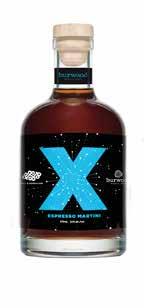
The label says, “A unique and revitalizing spirit”, and yes, 120 years ago the Royal Physician called upon Berry Bros. and Rudd to create a warming liqueur for King Edward VII’s health, yet we’d drink this any time! It’s viscous and mouth-filling, with warming heat from the ginger, and there’s a sweet citrus too. It has a Royal Warrant; add it wherever you’d add ginger beer to make you smile – in a Mule, a Ginger Cup… and often in your whisky!
CSPC 880353 $46-48
Bull Run 6-Year-Old Single Malt, Oregon, USA

Hands up! How many single malt whiskies have you tasted from Oregon? Well, this Portland distillery, founded by Lee Medoff (who started Aviation Gin), has been making sensational whiskies for the last 12 years, and you’re in for a treat when you taste the Bull Run (named for the local water source) single malt! Made from local malted barley, you’ll recognize the toasty, roasted grain and burnt brown sugar on your first sips that leave you with a happy mouth of full of cocoa and caramel.
CSPC 798816 $81-84
Highland Park Cask Strength Release No.3 Single Malt Scotch Whisky, Scotland

After the significant praise about the first two releases, it was looking entirely likely that we’d see No.3 and we weren’t disappointed. A meaty 64 percent ABV, it’s best with a splash of water to let the rich smokiness of the peated grains show through but also some almost delicate tropical notes, and a sultry, slightly salty finish. A beautiful spirt to roll around the mouth while savouring and relaxing.
CSPC 1196278 $140-150

Bourbon is only Bourbon when whiskey is made in a particular way, and it’s made in the United States. It’s a little like how a traditional method sparkling wine can only be champagne when it’s from the region of Champagne. Pedigree is everything. Bourbon is whiskey that follows specific regulations to safeguard quality – so only certain whiskeys can be designated bourbon. Ultimately, there are a number of styles of whiskey and all are worthy of exploration.
with whiskey has held steady since 2019 and Bourbon has seen a slight bump in popularity. That’s relatively impressive, considering we entered a global pandemic in 2020 and restaurants experienced significant slowdowns. It’s not really surprising considering whiskey is deeply ingrained in America’s history: In fact, United States Founding Father, George Washington, operated one of the largest whiskey distilleries in early America, producing 11,000 gallons in 1799.

People think Bourbon is only from Kentucky, but technically Bourbon can be made anywhere in the US. To be declared Bourbon it must be made from a minimum of 51% corn with the remainder of the Mash Bill consisting of malted barley, rye, or wheat; Bourbons with a higher amount of wheat are typically softer and sweeter in their profiles. Bourbon can be made anywhere in the United States, but it must be aged for some time in new oak barrels and must be bottled between 40% and 80%. If Bourbon is aged for at least two years in barrel, it can also be designated as “straight” Bourbon.
Tennessee Whiskey is made much like Bourbon, but it’s filtered before bottling – using sugar maple charcoal, and still has aging requirements in new oak barrels, can’t be coloured, flavoured or other spirits in the final product and the mash bill has to be a minimum of 51% corn. Perhaps most importantly, Tennessee Whisky has to come from Tennessee.
From barrel selection (new) to colouring or flavour additives (none) and storage, recipe, distillation and bottling, Bourbon is uniquely (and only) American. These and other characteristics are just the beginning of what makes whiskey and Bourbon so very special in the world of spirits. With the rise in cocktail culture and our affinity for all things craft, this is whiskey’s – and Bourbon’s – time to shine.
According to an IPSOS survey with Restaurants Canada , our love affair
The United States has a proud and noble tradition in crafting their whiskey, including their most unique expression –Bourbon. Bourbon itself was recognized by Congress back in 1964 as “a distinctive product of the United States” and is known the world over as a premium spirit made only in one place: the United States. Whiskeys, specifically Bourbon have firmly established top tier shelf space in bars and gained a foothold in pop culture, from the infamous Whisky a Go Go on
American Rye Whiskeys are all the rage right now in whiskey circles Made with at least 51% rye grains, the profile is lighter but also spicier than other American whiskeys. As with other whiskeys, no flavouring, colouring, or other additives can be included and still bear the name or Rye whiskey, Bourbon, or single malt whiskey. Two major styles are Pennsylvania or Maryland, but several distilleries are sourcing their grains to produce varied or unique styles. One great fact about age statements on American whiskeys is that generally longer periods of barrel aging aren’t needed compared to the UK or Canadian examples since most distilleries are in much warmer climates and the aging takes much less time!
Single Malt Whiskey has been riding a new wave of popularity over the past decade or so. Did you know that Single Malt Whiskey can be made anywhere in the world – including the United States? To be called a Single Malt it must be made entirely at a single distillery, and these can be made anywhere in the country Most American Single Malts are made from at least 51% malted grain, like corn, barley, or wheat This is the whiskey where terroir – that elusive sense of quality of place – will become most apparent.
Bourbon Day is June 14th this year and restaurants, bars, and other watering holes will likely be more than happy to share a drop or two and help you discover why these whiskeys have stood the test of time. And here are some whiskey recipes for you to try at home on Bourbon Day!
¼ OZ Bourbon
¼ OZ Aperol
¼ OZ mango nectar
¼ OZ lime
⅛ OZ honey syrup (for honey syrup blend 200 g honey with 100 g water)
5 dashes Angostura Bitters
Using a cut lime and Tajin Spice blend, rim a tall glass and set aside. In a shaker tin, measure all the ingredients accordingly except the ginger beer. Add ice and shake the mixture until the outside of the tins are nicely frosted. Strain the cocktail over fresh ice into the glass and top with ginger beer.
Recipe Courtesy Tabi Irani – 222 Bar
½ OZ Bourbon
¼ OZ Aperol


¼ OZ orange liqueur
¼ OZ lemon juice
Top with sparkling wine
In a shaker tin, mix all of the ingredients except for the sparkling wine and add ice. Shake the mixture until the outside of the tins are frosted and strain over fresh ice into a wine glass. Top with sparkling wine and express an orange peel over the cocktail. Garnish with a lemon and orange wheel.
Recipe Creator: Marta Ess – BKS Speakeasy at Muir
½ OZ Bourbon
⅜ OZ mezcal
⅜ OZ Averna
⅜ OZ fino sherry
4 dashes hazelnut liqueur

Measure all ingredients in a mixing glass and add ice. Stir the mixture until the desired dilution is achieved. Strain the cocktail into a stemmed cocktail glass and finish by expressing an orange peel over the cocktail. Garnish with manicured orange peel.
Recipe Creator: Daniel Désir – The Cloak Bar
https://americanwhiskeytrail.distilledspirits.org/american-whiskey-history
Stout, and to a certain extent, its cousin porter, have been gaining popularity this decade, and the numbers prove it. When looking back on past articles in Culinaire, we can see the growth in the number of stouts available in Alberta, especially those being brewed locally. They were first mentioned in Issue 8 (January/February 2013), when 26 were highlighted in Beers for A Dark and Stormy Night (out of about five dozen listings in Liquor Connect), however none were from Alberta. Admittedly, the provincial regulations that kick-started the current craft beer movement had yet come to pass, so there were only a handful of breweries to choose from.
Five years later, in The Renaissance
of Stouts and Porters (November 2018), there were over 340 listings; around 80 of which are brewed locally. Today, Liquor Connect lists about the same number of stouts and porters, however almost half of them are now from Alberta breweries. This doesn’t include beers that are only available seasonally, or those that are exclusive to a brewery’s taproom. The other notable feature of stouts is how the variety keeps growing. While there have always been several recognized sub-genres such as Irish, British and American stouts, brewers began fiddling with stout recipes centuries ago, leading to imperial, oatmeal and sweet (milk) stouts. Today, probably no single beer style, next to the IPA, gets to become a
brewer’s signature brew more than stouts. According to at least one highly regarded source (Craft Beer & Brewing magazine), in the past two and a half years, imperial stouts have garnered the highest rankings (over 20 percent) of all the beers they have judged. This jibes with Untappd’s* nine million users, where 41 of its top 50 beers are stouts. Clearly something is going on with this beer category.
While the traditional styles of stouts are becoming more prominent, newer versions are also getting attention. You’ll now find fruited versions, as well as ones accentuated by the addition of coffee or chocolate. Many brewers collaborate with a local coffee roaster or chocolatier

to create a stout which gives people an extra helping of one or the other. This has morphed into the newest fad, the pastry stout. Loved or loathed, it has become a style that tries to emulate a dessert in a beer format, sometimes through the creative use of malts, hops, or adjuncts, the latter of which may just be throwing a whole dessert into the recipe.
Imperial stouts are also trending, as aging beer (sometimes in a barrel), has become a new program for many breweries. Most can also be cellared for many years after release, making them popular with collectors. Stouts come in many varieties, so search them out. Here are just a few now being brewed in Alberta.
Coffee Stout
In addition to coffee, the use of oats, lactose, and/or vanilla will smooth the flavours and mouthfeel.
Common Crown Cool Beans Vanilla
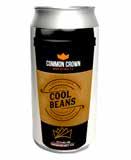
Latte Stout (Calgary)
CSPC 864031, $18, 4pk. cans

Blindman Brewing Coffee Stout (Lacombe)
CSPC 878798, $18, 4pk. cans
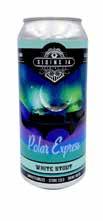
White Stout
Not all stouts are dark. Notably, the stout name originally had more to do with body and strength than colour. Usually pale gold, this style employs vanilla and cocoa nibs to give the beer a subtle chocolate flavour.
Siding 14 Polar Express (Ponoka)
CSPC 881584, $18 4 pk. cans
Milk Stout
The inclusion of lactose and/or sugar adjuncts provides extra sweetness to complement its natural bitterness.
Born Brewing Arm Candy (Calgary)
CSPC 815191, $18, 4pk. cans and Canela Horchata Milk Stout, $5 can. The latter contains rice, vanilla and cinnamon.

Imperial Stout
The biggest, baddest stout in the land. Rich, intense and multi-layered, very high in alcohol (often up to 12 percent ABV or more) with a sharp bitterness that gets lost in its complexity and depth. Flavours of dark chocolate and/or coffee dominate, but you may also find black licorice, caramel, vanilla, and hints of other spices. Some require aging to smooth out the rough edges, and many see time in a variety of barrels.
Dandy Dead Moon Night (Calgary)
CSPC 842130, $6 473 mL can
New Level Leviathan Russian Imperial Stout (Calgary)
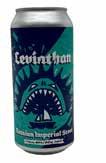
CSPC 811406, $5, 473 mL can (also bourbon barrel aged versions available)



Situation Brewing Sex Palace (Edmonton)
CSPC 843764, $21
4pk. cans mL can (also bourbon barrel aged versions available)
Pastry Stout
Not officially a recognized style of stout, but creative brewers can produce dessert flavours many ways.
Town Square White Wedding (Edmonton), known for throwing a whole wedding cake into the mash.

Peak Imperial Javalanche Coffee Milk Stout (Calgary)
CSPC 882714, $13 500 mL bottle
Big Rock Barrel
Aged Coffee Stout (Calgary) Aged six months in scotch barrels.
CSPC 880571, $14
650 mL bottle

Irish Stout
Made famous by the ubiquitous Guinness, there are many interpretations of this style. Look for a dry, smooth mouthfeel, with coffee and dark chocolate notes.
Wild Winds Brewery
The Snow Eater (future home in Pincher Creek)

CSPC 877062, $19 4pk. cans
CSPC 822250, $20 4pk. cans. Also check out their Raspberry Shortcake and Red Velvet versions, which get released from time to time.

New Level Brewing School's Out Imperial Peanut Butter and Jam (Calgary) $20
David has worked in liquor since the late 1980s. He is a freelance writer, beer judge, speaker, and since 2014, has run Brew Ed monthly beer education classes in Calgary. Follow @ abfbrewed.
South Africa is a rather unusual wine region in several regards, it’s a tremendously old wine producing place, but not European or Middle Eastern, so it’s not really part of the “Old World/New World” paradigm, but among its other unique qualities, it’s quite remote from other wine countries of the world, so it’s also isolated somewhat, like Australia and New Zealand. What works for the less isolated countries, might not work for South Africa.
Also, to consider, South Africa has had some problems in the Apartheid era and winning North American consumers back since. Thankfully, since those days, there has been a renewed interest in understanding in the vineyards, better site and clonal or varietal selection, and some rather urgent improvements in their water usage and water practices. Add some established, quality driven winemakers and a new batch of younger winemakers not afraid to buck convention, South Africa nowadays has a strong national commitment to sustainability. It’s never been a better time to experience some of these unbelievable wines gracing our shelves.
During the week of June 12 -16, Calgarians can take advantage of several events, tastings, and culinary experiences featuring Wines of South Africa. Visit wosa.co.za/SAWW
Find these wines by searching the CSPC code at Liquorconnect.com; your local liquor store can also use this code to order it for you. Prices are approximate.


So full of chewy, smoked meat characters, this is the vinous equivalent of a roadside barbecue joint. The kind of joint mentioned in half whispers, and no one is ever really sure you’d find it again, or if it would deliver the same sort of holy, existential barbecue we all deserve sometimes. This chewy, wonderful bottle is worth looking for – pair with –what else? Barbecue.
CSPC 810561 $20-23
Tom has been waxing on (and on) about wine, beer, and spirits for more than 25 years and freelances, consults, and judges on beverages all year long. He is the Managing Editor for Culinaire Magazine, and the Competition Director for the Alberta Beverage Awards.
Chenin blanc is a wonderful, nay –incredible white that does quite well in some places you might not expect. But honestly, some of the best examples come from South Africa. Here touches of honey, dried cereals, and crisp citrusy flavours are supported by tea leaf and some lovely spice. A rock-solid summer sipper that works very well as a barbecue white.
CSPC 804595 $20-23
A Bordeaux-style blend from South Africa, and a blend that we really should see more of from way down south. A little riper in the fruit that Bordeaux is most years but still showing off very classical style flavours - rich cherry fruit, spice, and a rather floral undercurrent. Nice and brassy on the palate but tannins are quite agreeable and make for a great value that is drinking well now.
CSPC 153882 $24-26


Some chenin shows off a Hudson Bay blanket sort of wooliness, this one is a bit more about the sheep than the wool. Rich and almost opulent with substance, texture, and the exact opposite of an over-filtered wine. Honey, lemon, and camomile tea come to the table, along with that unshorn sheep giving a touch of natural, organic farm style character. Bloody good, every time, perfect for filling a chenin shaped hole.
CSPC 260646 $31-34

Another heck of a bottle of chenin that brings all those wooly, spicy notes, but in this case, some added oomph to the nose with melon and a bit of dried lemons too. In the mouth, zippy and bright with a mild creaminess and rich vanilla tones. A bigger wine for the summer months, but one that might be a star at a barbecue too. Delicious.
CSPC 879211 $19-22
The joy of experiencing a great blend is when it encapsulates the best of each variety. Here, a blend of chenin blanc (yeah!) and semillon (double yeah!) pulls together and makes a tasty, almost sensual experience with wildly intense fruits, deep citrus, and a silky palate and a slightly waxy finish. Delicious, but try pairing with poultry, or good cheese if you can.
CSPC 827717 $44-48
We don’t see a ton of pinot gris from South Africa, but this is the sort of wine to change that. Citrusy with lemon drop and a mild woodiness and flinty character on the nose with a fine, steely approach too. Finely – and I mean finely – balanced palate with an overall approach showing little opulence or anything flabby. A tight pinot gris you could bounce a quarter off.
CSPC 801306 $31-34
This is a wine that is just shredded. Like a lightweight boxer or MMA style fighter. Finely balanced and a wine that has no extraneous features, but just a pure distillation of what being a chenin blanc is all about. Steely, citrus driven, a little woolly, and all about perfect crispness. Excellent, modern wine that shows off what chenin can be, and a wine that deserves some attention.
CSPC 857756 $18-20





The right sort of name for the right sort of wine that needs its own theme music. There’s a story here to be told, and I lack the space to tell it, but I can say this bottle is rife with white pepper, violets, and black fruit on the nose with wonderful consistency on the palate too. Clean, spicy (so very spicy), and delicious too, this would be a rock star if brisket or burgers are on the grill or smoker.
CSPC 800170 $31-34
South Africa
I’ve enjoyed this wine a few times before, and it’s always impressive. What I liked best about it this time around is the lovely balance of wild blackberries and a rich earthiness. It started me thinking about the wildest of berries you can sometimes find in the backcountry, and this wine is all about the bear’s blackberries. Wild, delicious, and a little dangerous.
CSPC 814439 $44-47
Stellenbosch,
A cabernet franc lead – not quite Bordeaux blend (10 percent syrah is in the mix) red that checks off all the boxes. Spicy on the nose with dried herb and dried wood tones and abundant, but not jammy, fruits lead into a balanced, full bodied red supported by rather tight tannins. Drinking exceedingly well now, it’s also the sort of barbecue match that works if there is a little fat on the steak or a little sugar in the sauce. Damn good.
CSPC 816840 $43-45
Only a few select places play around with a varietally labelled petit verdot – preferring instead to let those tannins and floral characters support other grapes, but when the right spot and the right winemaker come together…. *chef’s kiss*. Deep and dark with intense ripe berries and a luscious floral support this is a gem – perfect for a tired palate. Can age in the cellar for a bit, but better idea, pull the cork and heat up some steaks ASAP, this is a treat.
CSPC 817275 $31-35
Chenin Blanc Viognier,



South Africa
An unlikely, but ultimately wonderful marriage of chenin blanc and viognier that also manages to bring out the best of each with wildly floral, but also fruit rich expressions. On the palate it’s wonderfully rich with silken textures and a prominent and generous fruitiness. A fine bottle too for large gatherings. A label that has a strong commitment to the environment and giving back to the community too.
CSPC 407056 $18-20 on most shelves.
Visit culinairemagazine.ca / ABA to enter your products


OPEN TO ANY:
WINE < BEER < SPIRITS
MEAD < CIDER < MIXERS
SAKE < LIQUEUR
NON-ALCOHOLIC BEVERAGE
COOLERS < RTDS PREMADE COCKTAILS
For more information, contact Tom Firth tom@culinairemagazine.ca
Registration Deadline: June 30
Judging: July 18, 19, and 20
Results Published October culinairemagazine.ca/aba
Sponsors:
Vine & Dine at Las Canarias

June 21, June 27, and July 5
We’re thrilled to offer three 6-course pairing dinners of traditional and modern Spanish and Canary Island dishes at Las Canarias, and they are looking forward to sharing their love for this cuisine with you! All our dinners here last year sold out!
It’s South African Wine Week June 12-16, and we’ve arranged four superb Winemaker Dinners!
Culinaire | April 2023
June 13: Jason de Beer, of Morgenster Estate in Cape Town, is with us for one special night, where he’ll take us through his range and tell us the stories of the region. We’re at Oxbow, in Hotel Arts Kensington, for this deliciously indulgent evening! A welcome drink is followed by a 5-course premium pairing meal with imaginative plates prepared using local ingredients.
June 14: Join us at Safari Grill for a oneoff winemaker dinner with Pierre Nortje from Spier Wine Farm. We’re enjoying six courses of outstanding, authentic East African cuisine, for a unique culinary experience of rich and flavourful, satisfying food, and learning from Pierre about the winery, with perfect pairings!
June 14: Boschendal are with us at one of Calgary’s newest restaurants for an elevated five-course winemaker dinner. The Continental YYC are creating a special menu to perfectly complement the flavours of the Boschendal range - don’t delay in reserving your places!
June 15: We’re at the new Big Fish Open Range in Marda Loop for a fabulous one-off evening with Stephan Joubert of Bellingham Wine Estates. A sparkling reception with canapes is followed by a four-course premium pairing dinner!
Dinner at Flores & Pine, July 12
We are really excited for our first pairing dinner at the beautiful Flores & Pine for a multi-course, chef chef-crafted menu of inspired seasonal dishes.
Vine & Dine at Môt To, July 19 and 27
We’re coming back to Môt To for two delightfully tasty evenings of six delicious pairing courses of innovative, modern Vietnamese dishes – they were #5 in Air Canada's Best New Restaurants, 2022!
New events and dinners are added regularly so check vineanddine.ca as these evenings sell out rather quickly!
Email linda@culinairemagazine.ca to reserve your places, and/or to be included in our bi-monthly updates so you hear about events before the rest of the city. We try to cater for all allergies.

From Liverpool to New Zealand and back again, to Australia, Canada, Scotland, and back to Canada, Sam Clark has packed a lot into 30 years.
He was studying social work at the University of Auckland, and working as a counsellor for children's charity, Barnardo’s, when he helped a friend paint a wine shop wall and fell in love with all the bottles, starting his shift into the world of wine, spirits, and bartending. Moving to New Zealand’s South Island, where he met his partner, Clark worked in a hotel and even started a rickshaw business, before bartending in Melbourne, and then in 2018, at Fairmont Banff Springs’ Rundle Bar.
Wanting to hone his skills, he was hired at Vancouver’s PiDGin restaurant, where he gained his love of sake, before an opportunity arose with Johnny Walker at the Glenkinchie Distillery. “I lived in Edinburgh and used to drive through the Scottish countryside to the distillery every day,” he says. “They'd rebuilt four of their distilleries into amazing bars and beautiful venues, and I looked after the beverage side - I loved it.”
On returning to Canada, Clark worked with Banff Hospitality Collective, opening Hello Sunshine's bar and writing the beverage program. “Banff is slowly becoming a destination for food and drink”, he says. “I'm really proud to be a part of that and bolster Banff’s reputation. That's my passion now, I'm not planning to go anywhere.” He hadn’t anticipated working with Fairmont again, but he’d really enjoyed his time there, and when the opportunity for Regional Bar Manager came up, he had to go for it. “I work with fantastic people in three international
hotels. I get to work on exciting projects, such as our canned gin cocktails, and launch our new ‘Untamed’ whisky, and I have access to some of the most exclusive wines and spirits for our lists.”

Last year, Clark entered ‘World Class Canada’, his first cocktail competition, never expecting to get in. “I worked with some incredibly talented people; some are Canada's most creative minds. It's an amazing bonding experience for everyone, everyone wants each other to do well, then it's whoever scores the most points ultimately. But I see it more that you're playing against yourself as opposed to other people. I was very lucky, and placing third was huge.”
He had decided not to enter again this year, but went to a seminar to reconnect with some of the people, and they all said, ‘you should do it again’. “It was about two days before the deadline, but I had a drink planned and I just hit ‘send’ the day it was due.” He was accepted, and his first challenge was a live class cocktail class, which he did on the penthouse of Chateau Lake Louise - outside. “I didn't check the weather report; it was -25º C and it was a 10-minute live segment on Zoom. I could feel my hands going numb, but
the frostbite was worth it,” he laughs. Not only did he get through to the Nationals in Vancouver for three whirlwind days of seven challenges each showcasing a different spirit, he placed second!
So what is Clark’s special bottle?
“I have fun things in the cellar - I have sake from space and all sorts of random things, but ultimately, I chose Glenkinchie 12 (year-old). Being so close to the distillery, and watching the generations of families who work there, put a whole different perspective on how a spirit is made, and how much love and care and effort goes into something that we handle every day, but maybe as guests you don't look at the back bar and think about all the stories behind each bottle,” he explains. “I think it's a huge obligation as a bartender to speak to those stories.”
“I love Glenkinchie for its light, approachable notes; it works really well in cocktails too. There's nothing better for me than a Glenkinchie highball or espresso martini. When I open it, I’ll probably make a highball with some chamomile tea and some green apple, stretch it out with a bit of elderflower soda for something nice and refreshing, and I always like to share everything I have with friends.”













